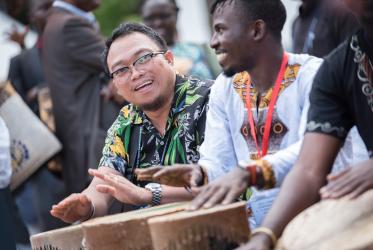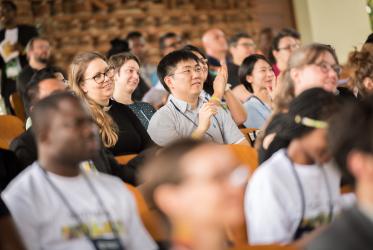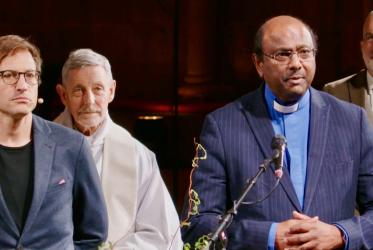Bossey’s story is both old and new but it’s younger than ever, says one of its graduates, a renowned ecumenical scholar who opened a book launch on the history of the institute that has had students from so many parts of the world.
Rev. Dr Robert K. Welsh was a student at the Bossey Institute in 1969-1970 and noted on 1 October an observation by Dagmar Heller, academic dean, on how the institute has aged.
“In 2016 the Ecumenical Institute turns 70 years old,” said Heller in the foreword to the updated history. “And unlike a man or woman of that age, Bossey looks younger today than it did 20 years ago.”
Welsh said the recent renovation of Bossey triggered innovation, making new ways for the institute to make itself available to the world through its broad ecumenical vision and now interfaith work.
The World Council of Churches (WCC) Ecumenical Institute was inaugurated in 1946 at the Château de Bossey, a scenic site on Lake Geneva that draws students from churches within and outside the WCC and from people of different faiths as well.
Netherlands’ pastor
Rev. Margarithe Veen, a Protestant pastor from The Netherlands who studied at the institute in 1998-1999, observed, “If there is one place in this world where the ecumenical spirit can truly be seen, then for me that place is Bossey.”
She was one of the alumni who spoke at the book launch of The Story of Bossey: A Laboratory for Ecumenical Life authored by Rev. Dr Hans-Ruedi Weber, but updated by Welsh.
Veen alluded to Bossey’s small, but beautiful chapel and the powerful spiritual impact it has on those who pray there.
“Thanks to Bossev's chapel, I experienced a way of worshipping where we were united with all our stories, backgrounds and traditions, whether or not we wished to be. This ecumenical spirituality helps me in a positive and inspiring way for myself and my parish work today.”
Like many of its students, Veen said it took time to adjust to the very special circumstances with small groups living in a study environment off the beaten track, but living in close proximity with one another for months.
“I received the conviction that the stories of the Bossey family based on the Gospel are faith-based ways of hope and confidence to go through the misery in this world,” said Veen.
Religious affairs administrator
An alum who could not attend the celebration was Dr Humberto Lagos-Schuffeneger. His regrets were read by Esther Suter, a Swiss pastor and journalist who attended Bossey at the same time in 1978-1979. Lagos-Schuffeneger said he is now responsible for religious affairs in the administration of Chilean President Michelle Bachelet.
In updating the book, Welsh said he first went back through 30 years of his own direct involvement with the board of Bossey.
“The most rewarding aspect of this work has been to discover the growing impact that Bossey has had in serving as the avant-garde of the whole ecumenical movement.
“It has moved from being a quiet, isolated academic community on Lac Léman to becoming a meeting place for the world's agenda in addressing issues of peace and globalization, of interfaith encounter, and of the care for God's creation and eco-justice.”
“The message of Bossey is finally borne out in the lives of persons who have been touched and marked and shaped by this place and its programmes - persons scattered across the whole world: proclaiming a vision of what it means to be ‘God’s people’ beyond the boundaries of nation, class, race, gender, and denominational or confessional identity,” said Welsh.
It should be a bridge of reconciliation and healing in the church and in the world; “yet reconciled and grounded in the same faith and same Lord”.
Stuttgart Pastor Wolfgang Marquardt from the Evangelical Church in Germany (EKD) was a student in 1996 when Bossey celebrated 50 years. He joked, “I only come for the jubilees.”
“To me the most important thing is not what I have learned..., the most important thing is that after Bossey everything I knew until then and everything I thought I knew, changed,” said Marquardt.
“Nothing was the same - not only in theology and worship and culture and countries, but also on food and sleep, manner, language.”
For Marquardt Bossey was special in another way. He met his wife Maureen Marquardt-Tubalawony from Indonesia, who is also a pastor, and they have been married for 20 years.
Alexander Stavnichuk from Germany, a 2014-2015 student, said he comes from the migrant community. He belongs to a Pentecostal charismatic tradition as a free evangelical pastor from the Mulheim Association of Free Churches.
“What impressed me the most was the generosity and hospitality of the teaching staff and the whole institute. Even though my church is not a member of the WCC I still felt loved and fully accepted and treated as a brother in Christ. This inspired me to see myself as a part of the WCC family,” he said.
“I believe there is a potential for this vision to be adopted by many other free evangelical churches, especially with Pentecostal charismatic background, which are not members of the WCC or distance themselves from the ecumenical movement.”
Bossey: forming ambassadors of reconciliation (WCC press release of 7 October 2016)
Fellowship in focus, as Ecumenical Institute in Bossey marks 70 years (WCC press release of 1 October 2016)
Book launch will feature The Story of Bossey (WCC press release of 30 September 2016)








